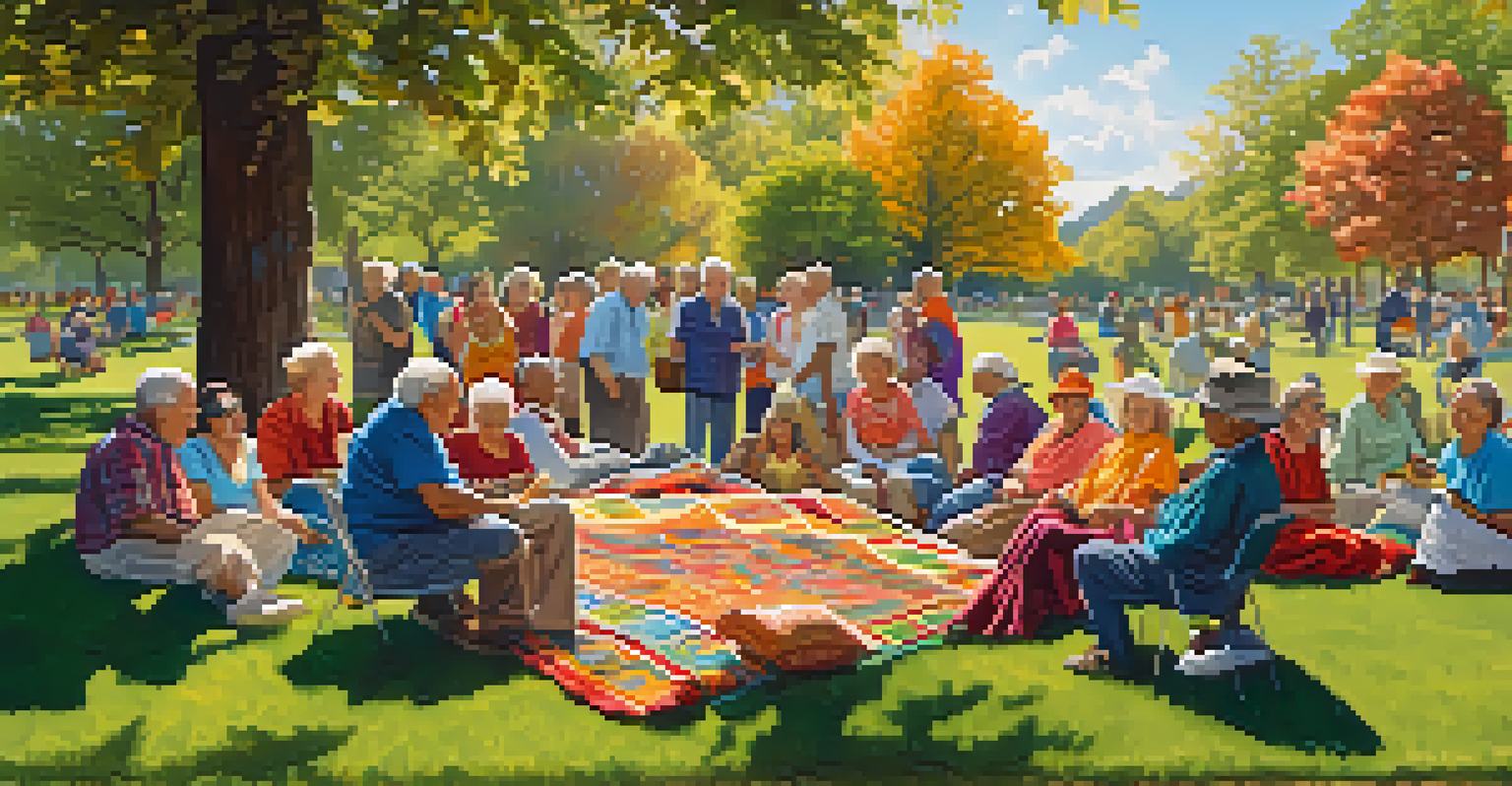The Power of Gratitude: Enhancing Happiness in Later Life

Understanding Gratitude and Its Importance in Aging
Gratitude, at its core, is about recognizing and appreciating the positive aspects of life. For older adults, this practice can be particularly beneficial as it helps shift focus away from challenges and toward moments of joy. By fostering a mindset of thankfulness, individuals can cultivate a more positive outlook as they navigate the complexities of aging.
Gratitude is not only the greatest of virtues, but the parent of all others.
Research shows that practicing gratitude can lead to improved mental health, reducing feelings of depression and anxiety. When seniors express gratitude, they engage with their memories and relationships, which can enhance their overall sense of well-being. This emotional boost can be pivotal in later life, where feelings of isolation may sometimes arise.
Moreover, gratitude can serve as a powerful tool in building connections with others. When older adults share their appreciation, it often leads to stronger bonds with family and friends. These social connections are vital for emotional health, creating a supportive network that can help combat loneliness.
The Science Behind Gratitude and Happiness
Numerous studies have linked gratitude with increased happiness levels in individuals of all ages. For older adults, engaging in gratitude practices, such as journaling or expressing appreciation verbally, can trigger the brain's reward system. This natural response can lead to an uplifted mood and a greater sense of fulfillment in daily life.

One study found that older adults who regularly practiced gratitude reported higher levels of life satisfaction compared to those who didn't. This suggests that gratitude isn't just a fleeting emotion; it's a state of mind that can lead to lasting happiness. As we age, embracing this mindset can help us navigate life's transitions more smoothly.
Gratitude Boosts Mental Health
Practicing gratitude can reduce feelings of depression and anxiety in older adults, enhancing their overall well-being.
Additionally, gratitude can improve sleep quality, which is crucial for overall health. When individuals reflect on positive experiences before bed, it can reduce negative thoughts and promote a sense of peace. A good night's sleep is vital for emotional regulation, allowing older adults to wake up refreshed and ready to embrace the day.
Simple Ways to Cultivate Gratitude Daily
Cultivating gratitude doesn't have to be complicated. Simple practices, like keeping a gratitude journal, can be incredibly effective. By writing down a few things they're thankful for each day, older adults can reinforce positive thinking and create a lasting habit of appreciation.
The roots of all goodness lie in the soil of appreciation for goodness.
Another easy way to foster gratitude is through mindfulness or meditation. Taking a few moments each day to reflect on positive experiences or the kindness of others can shift focus from stressors to blessings. This practice can be particularly beneficial during challenging times, as it helps maintain a balanced perspective.
Encouraging conversations about gratitude with family and friends can also deepen connections. Sharing what they appreciate about one another not only strengthens relationships but also reinforces a culture of gratitude. These shared moments of acknowledgment can brighten everyone's day.
The Role of Gratitude in Resilience
Gratitude can significantly enhance resilience, especially in later life when individuals face various challenges. By focusing on what they have rather than what they lack, older adults can better cope with adversity. This shift in perspective fosters a sense of hope and empowers individuals to navigate difficulties with grace.
For instance, during health crises or losses, practicing gratitude can help maintain a sense of purpose. Reflecting on cherished memories or supportive relationships can provide strength in tough times. This emotional cushion enables older adults to rebound more effectively from setbacks.
Gratitude Enhances Resilience
Focusing on gratitude helps older adults cope with challenges, fostering a sense of hope and purpose in difficult times.
Moreover, resilient individuals often inspire others around them. When seniors demonstrate gratitude and positivity, they set an example for younger generations. This ripple effect not only enhances their own happiness but also encourages a broader culture of appreciation within families and communities.
Gratitude's Impact on Physical Health
The benefits of gratitude extend beyond emotional well-being; they can also positively influence physical health. Research indicates that grateful individuals often engage in healthier lifestyle choices, such as regular exercise and balanced diets. This proactive approach to health can lead to improved longevity and quality of life.
Additionally, gratitude has been linked to lower levels of stress, which is crucial for maintaining a healthy body. Chronic stress can lead to numerous health issues, from heart disease to decreased immune function. By practicing gratitude, older adults can reduce stress and its harmful effects on their bodies.
Moreover, expressing gratitude can lead to better relationships with healthcare providers. When patients communicate their appreciation, it fosters a more collaborative and supportive environment. This connection can enhance the overall care experience and promote better health outcomes.
Sharing Gratitude with Others: Building Community
Sharing gratitude not only enriches personal relationships but also strengthens communities. When older adults express appreciation publicly, it encourages a culture of kindness and respect. This communal spirit can significantly enhance the overall happiness within neighborhoods and social groups.
Community events, such as gratitude gatherings or appreciation days, can be a wonderful way to bring people together. These events allow individuals to share their stories of gratitude and foster connections. Such gatherings create an uplifting atmosphere where everyone feels valued and recognized.
Gratitude Strengthens Communities
Sharing gratitude enriches personal relationships and builds a culture of kindness within communities, promoting overall happiness.
Moreover, volunteering and giving back is a powerful way to express gratitude. By helping others, older adults can foster a sense of purpose while also spreading positivity. This cycle of giving and appreciation can uplift entire communities, creating a ripple effect of happiness.
Embracing Gratitude for a Fulfilling Later Life
Incorporating gratitude into daily life can lead to a more fulfilling and meaningful later life. As older adults embrace this practice, they often find themselves more content and engaged with the world around them. This shift in mindset can lead to a more vibrant and joyful existence.
It's essential to remember that gratitude is a skill that can be developed over time. Just as one would exercise to strengthen muscles, practicing gratitude can strengthen one's emotional resilience and well-being. With consistent effort, older adults can cultivate a rich tapestry of appreciation that enhances their daily experiences.

Ultimately, the power of gratitude lies in its ability to transform perspectives and enrich lives. By focusing on the good, older adults can navigate the challenges of aging with grace and joy. Embracing gratitude isn't just about happiness; it's about creating a life filled with purpose and connection.